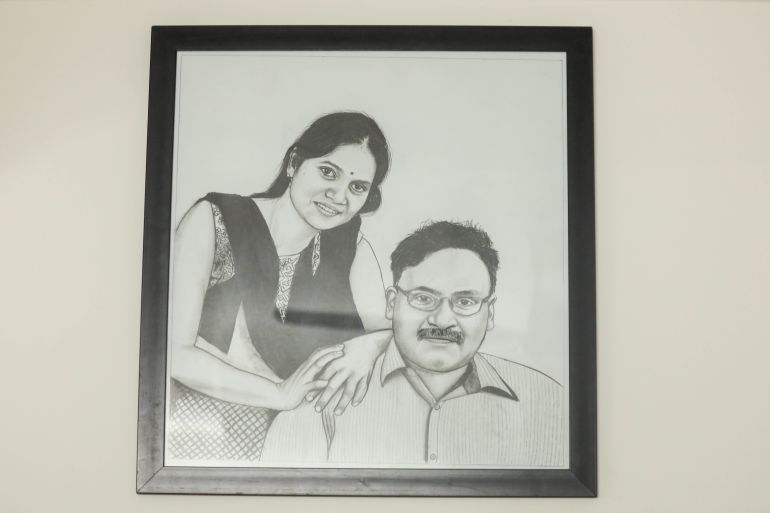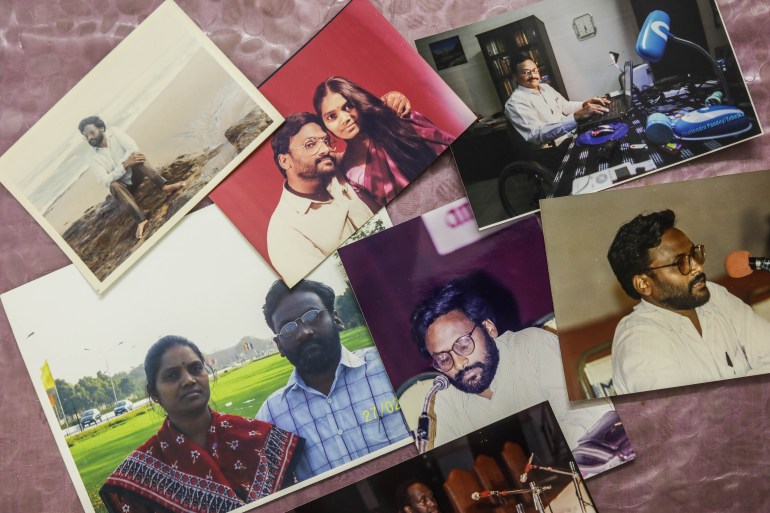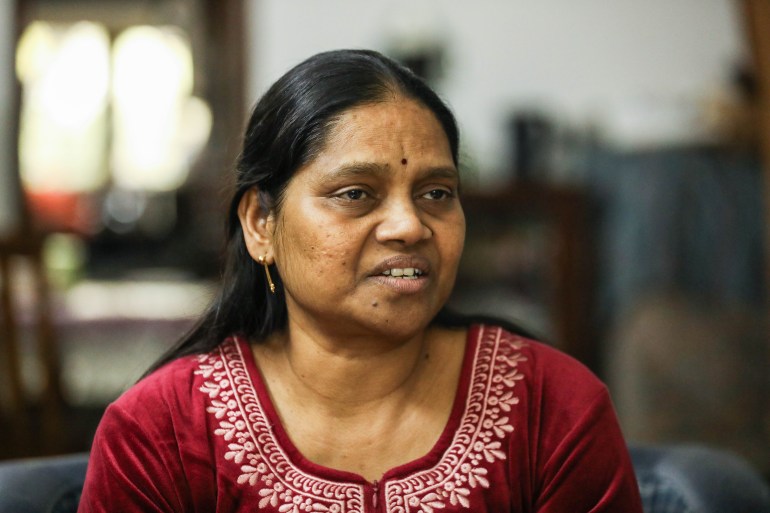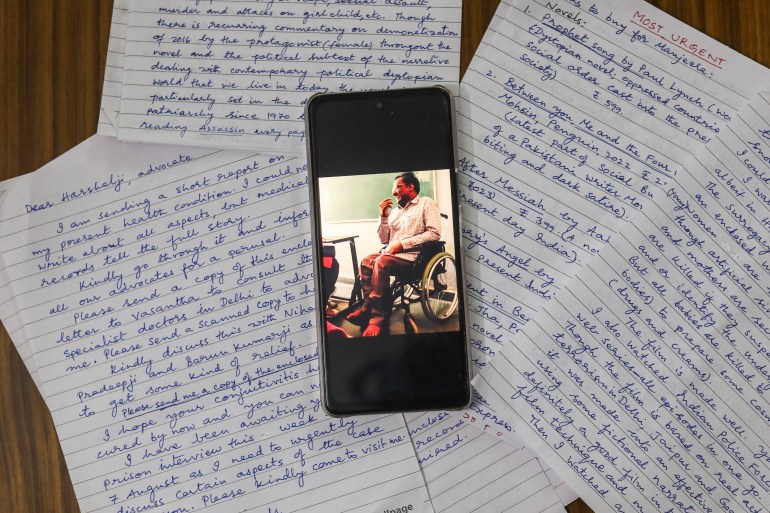‘Joyful but afraid’: Disabled Indian academic Saibaba’s family on acquittal
The wheelchair-bound former Delhi University professor is acquitted after 10 years of imprisonment over alleged Maoist links. His family asks: Who will pay for the lost years?

New Delhi, India – Vasantha Kumari shuffles through things she needs to pack for her visit to Nagpur where she will meet her academic husband, Gokarakonda Naga Saibaba, who is being released from prison after a decade for suspected links with Maoist rebels.
Saibaba, 57, a professor of English who is paralysed waist down and uses a wheelchair, was arrested in May 2014 for being an alleged member of the banned Communist Party of India (Maoist) and charged under the Unlawful Activities Prevention Act (UAPA), an anti-terror law declared “draconian” by several rights groups.
Keep reading
list of 4 itemsIndia must end ‘inhumane’ detention of activist GN Saibaba, says UN expert
India professor held for alleged Maoist links
Why are the Indian authorities afraid of a ‘half-Maoist’?
In March 2017, he was sentenced to life imprisonment.
On Tuesday, Saibaba was acquitted along with four others of all charges by the Nagpur bench of the Bombay High Court. Pandu Narote, the sixth accused in the case, died in August 2022 awaiting the verdict.
This is Saibaba’s second acquittal. In October 2022, the Bombay High Court ordered his release, saying legal procedures were not properly followed during the trial. But within 24 hours, the Supreme Court cancelled the order, stating the charges against Saibaba and the other accused were “very serious” and required a new hearing.
“On one side, we are joyful; on the other, we are afraid. They did the same thing in 2022. I know he has not done anything wrong. But now, I can only hope,” Kumari, also 57, told Al Jazeera as she prepared to travel to Nagpur, 1,072km (666 miles) south of New Delhi to receive her husband.

She has reasons to be worried. Within hours of the court order, the government in Maharashtra state, which had prosecuted Saibaba and others in the case, again approached the Supreme Court to challenge the acquittal.
In its 293-page verdict on Tuesday, the Bombay High Court said the prosecution had failed to establish the grounds on which Saibaba was arrested in the case, including the allegedly incriminating material found at his New Delhi residence.
The court held that mere possession of Maoist literature did not constitute an offence under the UAPA – an overturning of the same ground on which another court had ordered his life imprisonment in 2017.
‘Voice of tribal rights’
Saibaba, who taught at Delhi University, rose to prominence nearly 15 years ago when he protested against Operation Green Hunt, a paramilitary offensive launched by the Congress-led government in power at the time to crush an armed Maoist rebellion in several parts of central and western India.
The Maoists say they are waging a war against the Indian state to protect the rights of the tribal and marginalised people, many of whom live in forests sitting on top of vast mineral reserves eyed by influential private corporations.
Nandita Narain, retired maths professor and former president of the Delhi University Teachers’ Association (DUTA), told Al Jazeera her colleague Saibaba is a powerful voice in support of tribal rights.
“[The] state is particularly bent on silencing voices in support of tribal rights in areas where a corporate plunder is taking place because the land is very mineral rich,” she said. “He posed a greater challenge to the state and the corporates. That is why they wanted to silence him.”
Activists have described Saibaba’s imprisonment as a national security threat, despite his serious paralysis, as a textbook case of India’s prolonged – and often botched – court trials as well as denial of facilities to disabled inmates in the country’s perpetually cramped prisons.
Saibaba has had permanent post-polio paralysis since he was five. He used to crawl on the ground and wore slippers on his hands until he moved from Hyderabad to New Delhi in 2003 to teach at Delhi University’s Ram Lal Anand College and was finally able to buy a wheelchair.
During his decade-long imprisonment, he was twice infected with COVID-19, once with swine flu, and diagnosed with severe health conditions including hypertrophic cardiomyopathy with left ventricular dysfunction, a brain cyst, kidney stones and acute cervical spondylitis.
His wife Kumari said he never got the treatment he needed in jail. “He faints frequently. He requires physiotherapy and cardiac monitoring,” she said, adding that she plans to get her husband treated at a good hospital when he is freed.

In the summer of 2022, Saibaba had staged a three-week protest, including a four-day hunger strike, to get a plastic water bottle in his cell. He had also protested against a wide-angle CCTV camera recording the toilet and bathing area of his prison. Following the protest, the jail authorities allowed him to keep a water bottle and the camera angle was tilted.
When his mother died of cancer in 2020, Saibaba was denied permission to attend her funeral. Kumari claimed the courts and the state discriminate in granting bails or acquittals based on the accused’s political and ideological associations.
“You see how other accused are granted bail and acquitted so quickly, including rape and murder charges. However, when people like my husband are acquitted, the state steps in and prevents him from being released, keeping him in jail,” she said.
In August last year, Mary Lawlor, the United Nations special rapporteur on human rights, slammed Saibaba’s prolonged detention as “inhumane”, citing grave concerns for his health and demanding an immediate release.
Lawlor said his small cell had no window and a wall made of iron bars, “exposing him to extreme weather, especially in the scorching summer heat”.
‘He lost 10 years of his life’
For Kumari and their 26-year-old daughter Manjeera, the last 10 years have been harrowing.
Saibaba was suspended by Delhi University shortly after his arrest. The family was forced to vacate university housing and received only half of his salary until 2021, when he was sacked.
“In 2014, some intellectuals, students and writers formed a committee for Saibaba’s release. Through them, I received some financial and legal assistance,” said Kumari.
But that was not enough. Kumari had to sell her car in 2017 because she needed money to run the household. Meanwhile, she applied for odd jobs but could not find anything. She is a biology graduate but never had a full-time job.
“I do some freelance work in Telugu language, but that barely pays for anything. I tried to get work. But when even young people aren’t getting any jobs, who would hire me?” she asked.
Even undertaking the 15-hour train journey to visit her husband was difficult to afford for Kumari, who last saw her husband in November. She said she used to meet him once a year because the travel was financially draining.
“At the prison, I had to stand in a queue at 7am and only got to meet him for 20 minutes, during which he inquired about the status of the case and told me what to say to the lawyer,” she said as she flipped through the letters Saibaba had written to her from prison.

Kumari said he was not writing much lately as she held a letter Saibaba wrote on October 24 which she said they only received this month.
“This is his first letter in three months. He couldn’t write anything because of swelling in his right elbow. He couldn’t even hold a book or newspaper,” she said. “These 10 years apart have been extremely painful. He has lost 10 years of his life. They won’t be able to give us those years back.”
Kumari said Manjeera was only 16 when her father was imprisoned. “When she needed her father the most, he was not present.”
In UAPA cases, activists say the process is often the punishment. Only 2.2 percent of such cases registered between 2016 and 2019 resulted in convictions, but the law makes obtaining bail extremely difficult and rare.
Legal experts say the police use the stringent law when they have a weak case against an accused and want to prevent them from getting bail.
Narain, the retired professor, believes Saibaba’s decade-long imprisonment shows that the Indian courts are “compromised” and have failed him and his family.
“People like him are a moral beacon for the entire country. In any other country, they would be revered. They are role models. They have gone beyond their own personal interests and worked for the ordinary people of this country,” she told Al Jazeera.
Back at their ground floor rented house in New Delhi’s Vasant Vihar area, a parcel of books lay on a coffee table near the window, which Kumari had meant to post to her jailed husband.
That’s one less thing she needs to worry about. “I won’t need to mail them now. He can read them at home when he is released.”